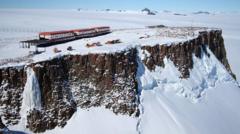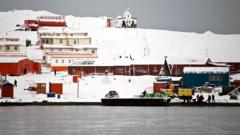The conflict at the South African-run Sanae IV research station arises as a team of nine scientists, conducting research during the Antarctic winter, confronts serious interpersonal issues including alleged physical assault and harassment.
Allegations of Assault at South African Antarctic Research Station Spark Concerns

Allegations of Assault at South African Antarctic Research Station Spark Concerns
A remote Antarctic research facility faces turmoil following assault allegations against a team member.
The Sanae IV research station, stationed about 170 km from the southern edge of the Antarctic ice shelf, has been a site of scientific study since 1959. Recently, it has become the center of controversy following allegations of assault against one of its researchers. According to a government spokesperson, there was "an assault" reported, which follows prior complaints of inappropriate behavior within the camp.
The South African environment ministry, which oversees the expedition, has stated that it is addressing these concerns with "utmost urgency." South Africa's Sunday Times, the first news outlet to report on this incident, detailed that team members have requested to be rescued due to the escalating fears related to their colleague's conduct.
In an attempt to restore harmony, the environment department highlighted that all personnel underwent thorough evaluations—including background and medical checks—prior to their deployment. However, they acknowledged that acclimating to remote locations can sometimes lead to behavioral adjustments. The incident was initially reported on February 27, after the team had begun their winter stay, which is typically a 13-month commitment.
Further investigations are underway targeting allegations of sexual harassment, although claims of sexual assault have been refuted. Reports indicate that the supposed perpetrator has expressed remorse, has cooperated with psychological evaluations, and issued a formal apology to the victim.
The cause of the alleged assault appears to be linked to a disagreement over task assignments, demonstrating how conflicts over seemingly minor issues can exacerbate tensions in isolated environments. Experts on isolation dynamics suggest that the high-stress conditions and close quarters are conducive to conflicts that might not arise under normal circumstances, prompting anxious reactions in confined settings.
As the management plan unfolds, officials have emphasized their commitment to support the team on-site and emphasized the importance of discipline amidst the crisis. Rescues from such remote locations can be complicated by extreme weather conditions characterized by sub-zero temperatures and harsh winds, yet South Africa reportedly has the means to facilitate such a response if necessary.
Although rare, instances of conflict at remote research stations are historically not unprecedented, with past cases indicating the need for robust mental health support systems in isolated work environments.
The South African environment ministry, which oversees the expedition, has stated that it is addressing these concerns with "utmost urgency." South Africa's Sunday Times, the first news outlet to report on this incident, detailed that team members have requested to be rescued due to the escalating fears related to their colleague's conduct.
In an attempt to restore harmony, the environment department highlighted that all personnel underwent thorough evaluations—including background and medical checks—prior to their deployment. However, they acknowledged that acclimating to remote locations can sometimes lead to behavioral adjustments. The incident was initially reported on February 27, after the team had begun their winter stay, which is typically a 13-month commitment.
Further investigations are underway targeting allegations of sexual harassment, although claims of sexual assault have been refuted. Reports indicate that the supposed perpetrator has expressed remorse, has cooperated with psychological evaluations, and issued a formal apology to the victim.
The cause of the alleged assault appears to be linked to a disagreement over task assignments, demonstrating how conflicts over seemingly minor issues can exacerbate tensions in isolated environments. Experts on isolation dynamics suggest that the high-stress conditions and close quarters are conducive to conflicts that might not arise under normal circumstances, prompting anxious reactions in confined settings.
As the management plan unfolds, officials have emphasized their commitment to support the team on-site and emphasized the importance of discipline amidst the crisis. Rescues from such remote locations can be complicated by extreme weather conditions characterized by sub-zero temperatures and harsh winds, yet South Africa reportedly has the means to facilitate such a response if necessary.
Although rare, instances of conflict at remote research stations are historically not unprecedented, with past cases indicating the need for robust mental health support systems in isolated work environments.




















